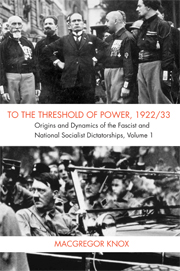 To the Threshold of Power, 1922/33
To the Threshold of Power, 1922/33 Published online by Cambridge University Press: 05 June 2012
In the beginning was the deed.
Heinrich Class, after Goethe's Faust, 1912
Burckhardt's “pleasant twentieth century” descended upon Europe in August 1914. The Great War, as Europeans soon named it, opened the age of war and revolution that burned away much of the wealth and most of the optimism accumulated in the long peace. The “era of wars” that Burckhardt had foreseen killed a far smaller proportion of the population than the fourteenth-century Black Death. Yet war, aftermath, and renewed war after 1939 savaged at least some of the societies it struck as thoroughly as its seventeenth-century forerunner and the associated “little ice age” of climate-induced famine and epidemic. In absolute numbers it was the greatest catastrophe in Europe's long history. And this Second Thirty Years War – the 1914–45 German War of global hegemony – was entirely man-made.
The first round of the larger struggle, the Great War of 1914–18, was Europe's first full-scale industrial war. It established conclusively what shrewd consideration of the U.S. Civil War had suggested: that French collapse in 1870–71 had been a happy exception, the product of ineptitude in exploiting railroad and telegraph for mobilization and concentration. After 1914 it became increasingly clear that industrial wars did not end until one adversary or coalition had battered the other into submission. War was no longer – if it had ever been – simply a momentary clash of warrior elites, but a test of the strength and staying power of entire societies.
To save this book to your Kindle, first ensure no-reply@cambridge.org is added to your Approved Personal Document E-mail List under your Personal Document Settings on the Manage Your Content and Devices page of your Amazon account. Then enter the ‘name’ part of your Kindle email address below. Find out more about saving to your Kindle.
Note you can select to save to either the @free.kindle.com or @kindle.com variations. ‘@free.kindle.com’ emails are free but can only be saved to your device when it is connected to wi-fi. ‘@kindle.com’ emails can be delivered even when you are not connected to wi-fi, but note that service fees apply.
Find out more about the Kindle Personal Document Service.
To save content items to your account, please confirm that you agree to abide by our usage policies. If this is the first time you use this feature, you will be asked to authorise Cambridge Core to connect with your account. Find out more about saving content to Dropbox.
To save content items to your account, please confirm that you agree to abide by our usage policies. If this is the first time you use this feature, you will be asked to authorise Cambridge Core to connect with your account. Find out more about saving content to Google Drive.